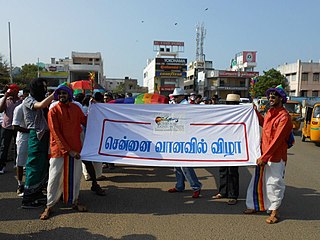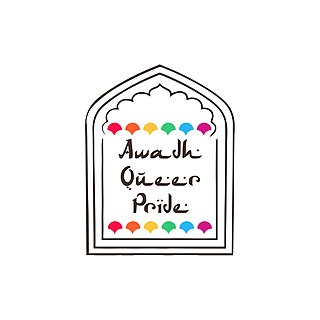
Dehradun, also known as Dehra Doon, is the winter capital and the most populous city of the Indian state of Uttarakhand. It is the administrative headquarters of the eponymous district and is governed by the Dehradun Municipal Corporation, with the Uttarakhand Legislative Assembly holding its winter sessions in the city as its winter capital. Part of the Garhwal region, and housing the headquarters of its Divisional Commissioner, Dehradun is one of the "Counter Magnets" of the National Capital Region (NCR) being developed as an alternative centre of growth to help ease the migration and population explosion in the Delhi metropolitan area and to establish a smart city in the Himalayas.
Throughout the year, different organizations host pride parades in Nepal. Blue Diamond Society, an LGBT rights organization, in 2010 organized Gai Jatra Gay March, with most participants on masks to prevent being identified by suspected homophobic people. In recent years, many pride parades in different times of the years have been organized. Due to criticism of Blue Diamond Society for organizing pride parade in Gaijatra festival many organizations deviated into new rallies. All the parades by Blue Diamond Society have coincided with the Gaijatra festival. The parades end with a candle-light vigil in memories of those who died in the past year, promoting equality for all.
Pune Pride is an annual LGBT pride parade that was first held in Pune, Maharashtra on 11 December 2011. It is the second Pride parade to be organized in the state of Maharashtra, after the Queer Azaadi Mumbai Pride March.

India has a long and ancient tradition of culture associated with the LGBTQ community, with many aspects that differ markedly from modern liberal western culture.
Queer Azaadi Mumbai Pride March, also called Queer Azaadi March and Mumbai pride march, is an annual LGBTQIA pride parade that is held in the city of Mumbai, capital of Maharashtra, India. It usually begins from Gowalia Tank ending at Girgaum Chowpatty. It, along with the Pride Week, is organized by Queer Azaadi Mumbai, a collective of organizations and individuals working for the rights of LGBTQIA community. The participants of the march include people from the LGBTQIH community as well their "straight allies", from India and outside. In addition to being a celebration of queer pride, the pride march and related events are a platform to ask for equal rights.

Delhi Queer Pride Parade is organised by members of the Delhi Queer Pride Committee every last Sunday of November since 2008. The queer pride parade is a yearly festival to honour and celebrate lesbian, gay, bisexual and transgender people, and their supporters. The parade usually runs from Barakhamba Road to Tolstoy Marg to Jantar Mantar.

Dehradun Terminal railway station is a railway station in Dehradun, Uttarakhand, India, on the Northern line of the Northern Railway network. It is owned by Indian Railways.

Queer Pride Guwahati was organised for the first time by the members and supporters of the local LGBT community in Guwahati, Assam on 9 February 2014. The Queer Pride Guwahati was the first LGBT Pride in the entire North Eastern India. The Pride is now an annual event.

The Chennai Rainbow Pride March has been held by members of Tamil Nadu LGBTIQA+ communities every June since 2009. The pride march is organised under the banner Tamil Nadu Rainbow Coalition, which is a collective of LGBT individuals, supporters, and organizations working on human rights and healthcare for the LGBTQIA community. The Pride March occurs on the final Sunday of June every year. The Pride March is usually preceded by a month-long series of events organized by NGOs and organizations to inculcate awareness and support for the LGBTQ community, such as panel discussions, film screenings, and cultural performances. The Chennai Vaanavil Suyamariyadhai Perani a.k.a. Chennai Rainbow Self-Respect March is known for being inter-sectional in nature as it addresses issues with multiple axes such as caste, class, religion coupled with gender discrimination.

Awadh Queer Pride is an annual event held in Lucknow, India. It was first held on 9 April 2017, and in the years since has also been held in February and March. It is organized by the Awadh Queer Pride Committee (AQPC), which is made up of volunteers.
Kolkata Rainbow Pride Walk (KRPW) is the oldest pride walk in India and South Asia. The first march in Kolkata was organised on 2 July 1999. The walk was called The Friendship Walk. Kolkata was chosen as the first city in India to host the march owing to Kolkata's history of movements for human and Political Rights. Currently, Kolkata Rainbow Pride Walk is organised by the Kolkata Rainbow Pride Festival (KRPF).

The Bhopal Pride March was an event held in 2017 to celebrate lesbian, gay, bisexual, and transgender (LGBT) culture in Bhopal, India.
The Chandigarh LGBTQ Pride Walk is an annual march held as part of the "Garvotsava" pride week celebrations in Chandigarh, the capital city of the northern Indian states of Punjab and Haryana. The event aims to celebrate and bring together the LGBTQ community and its supporters.
Hyderabad Queer Pride has been celebrated on one of the Sundays in February since 2013. First held on 3 February 2013, Hyderabad became the 12th Indian city to join the queer pride march bandwagon, fourteen years after the first Indian pride march was held in Kolkata. In 2015 it was renamed as Hyderabad Queer Swabhimana Pride, emphasising the self-respect and the acceptance of the community of themselves, as they are. In 2016 it was altered to Hyderabad Queer Swabhimana Yatra and has been retained since.
The Patna Pride March, held in Patna, India, is a civil rights march for lesbian, gay, bisexual, transgender, and queer (LGBTQ) people to build communities and socialize. There have been three iterations of the march over a period of seven years.
Queer Gulabi Pride Jaipur is the name of Rajasthan's LGBT Queer pride walk, first held in March 2015 in Jaipur and organised by Nai Bhor Sanstha, a community based organisation working for LGBT rights and development for the last 15 years.

Bengaluru Namma Pride March is a queer pride march that is held annually in the city of Bengaluru in Karnataka, India, since 2008. The march is organised by a coalition called Coalition for Sex Workers and Sexuality Minority Rights (CSMR). The pride march is preceded by a month of queer related events and activities.

Orange City LGBT Pride March or Nagpur Pride Parade is the pride march organised annually in Nagpur, Maharashtra. It was started in the year 2016. It is a festival to honour and celebrate Lesbian, Gay, Bisexual and Transgender people and their supporters.
Bhubaneswar, the capital city of Odisha, India, held its first Pride Parade on 27 June 2009. Since then Pride has happened in 2010 and then again in 2018. Hundreds of people from Bhubaneshwar, Cuttack and other parts of Odisha take to the streets to celebrate the city's LGBTQ+ Pride Parades.
LGBT Pride marches have been held in the Indian state of Gujarat in various cities since 2013. The first LGBT pride march was held in Surat on 6 October 2013. Since then, pride march in the state has been held in Ahmedabad and Vadodara.









